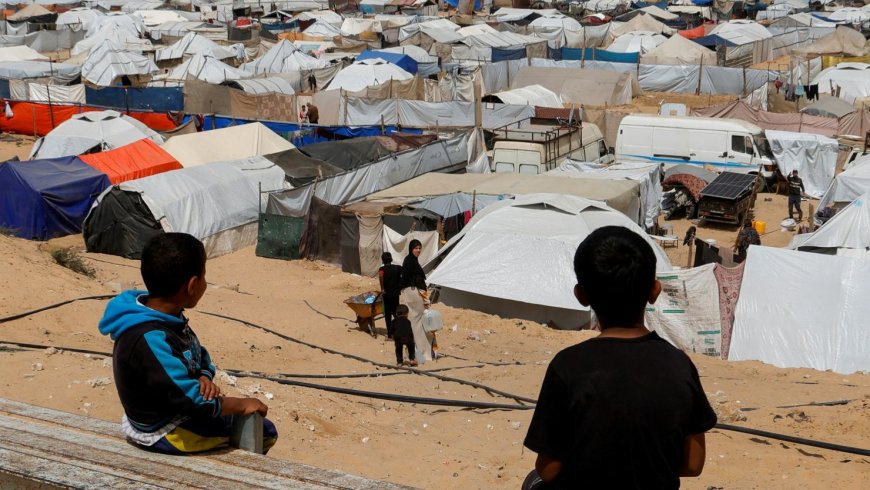Gaza Offensive Approved: Israeli Military Prepares for Escalated Campaign with Devastating Tactics
Israeli military leaders approve a new Gaza offensive plan featuring scorched-earth tactics, sparking fears of higher civilian casualties and further regional destabilization.

A New Phase in the Gaza Conflict
The Israeli military has formally approved a new offensive strategy in Gaza, one that intelligence insiders describe as “scorched-earth in nature,” signaling a potentially severe escalation in a conflict that has already claimed thousands of lives. According to initial reports, the plan calls for wider target zones, rapid ground advances, and heavy use of artillery and airstrikes aimed at dismantling both military and civilian infrastructure linked to Hamas operations.
Senior defense officials in Tel Aviv reportedly signed off on the strategy late Wednesday after weeks of deliberations with the security cabinet. The decision comes amid mounting political pressure on Prime Minister Benjamin Netanyahu’s government to secure decisive military gains, even as humanitarian organizations warn of catastrophic consequences.
A Strategy with High Civilian Risk
Military analysts note that scorched-earth tactics, historically used to deny enemy forces operational capacity, inevitably result in widespread destruction of non-military assets. In Gaza—a densely populated coastal enclave—such an approach would almost certainly lead to large-scale civilian casualties and the displacement of tens of thousands.
“The nature of Gaza’s urban environment means there’s no clean way to execute this,” said Dr. Eli Zohar, a defense strategist with the Herzliya Institute. “Every expansion in operational scope magnifies humanitarian costs exponentially.”
Diplomatic Fallout Expected
The timing of this approval is delicate. Multiple regional actors, including Egypt and Qatar, have been facilitating indirect negotiations aimed at de-escalation. With Israel now signaling a more aggressive stance, diplomatic mediation efforts could unravel.
The United Nations has already expressed alarm. In a briefing at the UN Headquarters in New York, humanitarian chief Martin Griffiths warned that “any expansion of hostilities in Gaza will not only devastate civilian populations but also destabilize the broader Middle East.”
Impact on Gaza’s Already Strained Infrastructure
Gaza’s infrastructure is in critical condition following months of sustained bombardment. Electricity availability is limited to four to six hours per day, clean water supplies are scarce, and hospitals are operating beyond capacity. Aid groups, including the International Committee of the Red Cross (ICRC), have cautioned that another wave of attacks could completely collapse Gaza’s healthcare system.
The Political Calculus in Tel Aviv
Political observers suggest that Netanyahu’s government is under intense domestic pressure. Following a series of attacks by Hamas on Israeli border towns earlier this year, public confidence in the government’s security policy has dropped sharply. Critics within Israel argue that military escalation could become a political shield, shifting public discourse away from internal controversies, including ongoing corruption trials against Netanyahu.
“This is as much about political survival as it is about national security,” noted Professor Rami Lev, a political science expert at Hebrew University.
Historical Parallels and Military Doctrine
Scorched-earth strategies have been employed in conflicts from the American Civil War to World War II, often with the intent of exhausting enemy resources. However, in modern asymmetric warfare—where one side is a state military and the other a non-state armed group—the ethical implications and international law violations become far more pronounced.
International humanitarian law, under the Geneva Conventions, strictly prohibits indiscriminate attacks and the destruction of civilian property not justified by military necessity. If implemented as described, Israel’s new Gaza plan could trigger war crimes allegations at the International Criminal Court (ICC).
Hamas Response and Preparedness
Reports from within Gaza suggest that Hamas is already fortifying its tunnel network, repositioning command centers deeper underground, and preparing for urban guerrilla warfare. The group’s media wing has labeled the upcoming Israeli strategy as “an open declaration of war on Gaza’s civilians,” framing it as a rallying cry for resistance.
Humanitarian Aid Agencies Brace for Crisis
The Norwegian Refugee Council (NRC), Médecins Sans Frontières (MSF), and UNRWA have all increased emergency stockpiles of food, medicine, and fuel in anticipation of the escalation. Still, aid delivery remains dangerously limited by ongoing blockades.
Jan Egeland, Secretary-General of the NRC, stated, “We are running out of time. The humanitarian space in Gaza is shrinking by the day, and another massive military campaign could close it entirely.”
International Reactions
The United States, Israel’s closest ally, has thus far offered muted criticism. A U.S. State Department spokesperson reiterated Washington’s support for Israel’s right to self-defense but urged the government to “consider proportionality and civilian protection” in operational planning.
Meanwhile, the European Union has been more direct. EU foreign policy chief Josep Borrell called the strategy “deeply concerning” and warned that “military escalation without a clear post-conflict plan will only prolong suffering and instability.”
Potential Scenarios Ahead
If the plan proceeds as approved, analysts foresee three primary scenarios:
-
Rapid but Costly Victory – Israeli forces achieve quick operational success but at the expense of high civilian casualties, leading to international isolation.
-
Drawn-Out Conflict – Hamas adapts to the new offensive, prolonging the fighting into a war of attrition, further eroding Gaza’s livability.
-
Unexpected De-escalation – Diplomatic intervention forces a strategic pause, though tensions remain unresolved.
Conclusion: A Turning Point in the Gaza Conflict
Israel’s approval of a scorched-earth Gaza offensive marks a dangerous turning point. The military may seek decisive results, but history shows that such tactics rarely yield lasting peace—especially in environments where civilian suffering becomes a rallying force for resistance.
Whether this strategy will reshape the conflict or entrench it further remains to be seen. What is certain is that the people of Gaza—already enduring a humanitarian catastrophe—will bear the heaviest burden.








